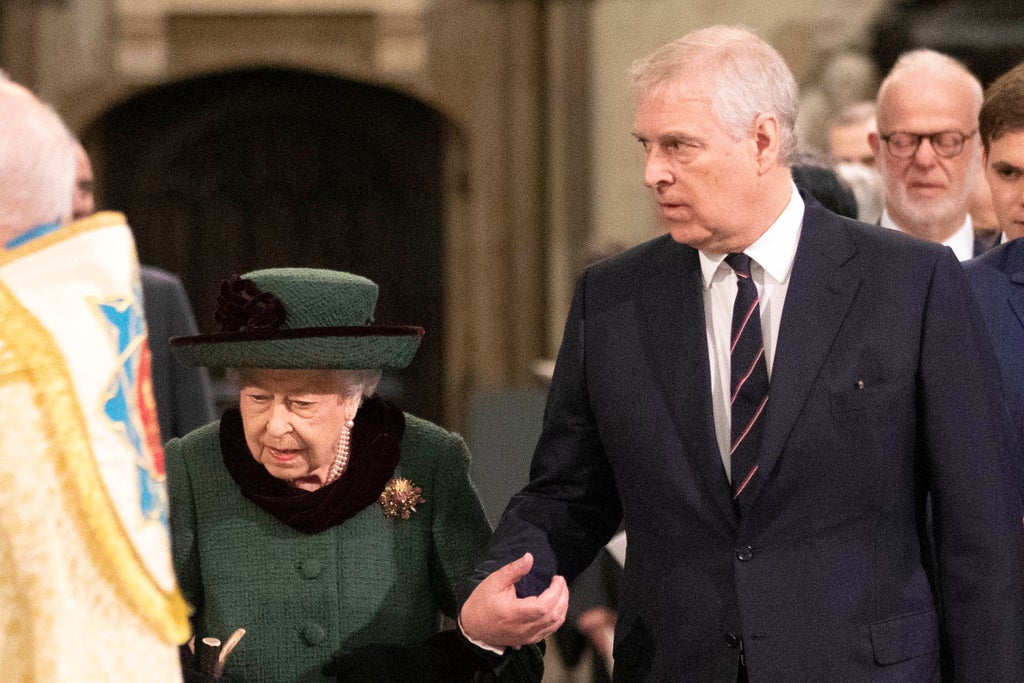
The Duke of York made his first public appearance since he settled a civil sexual assault case against him earlier this week at a memorial service held for his father, the Duke of Edinburgh.
But his prominent role in escorting the Queen to the event and walking her through Westminster Abbey came as a shock to many.
Prince Andrew had largely disappeared from royal life and was stripped of his honorary military titles and patronages by the Queen in January.
He stepped back from royal duties in 2019 following his disastrous interview on BBC Newsnight.
The Duke was questioned on his friendship with convicted paedophile Jeffrey Epstein. He also faced allegations of sexually assaulting Virginia Giuffre when she was 17, after she was trafficked by Epstein.
Andrew has consistently denied all allegations and maintained that he has no recollection of ever meeting Giuffre. In February, he reached a multi-million pound settlement, including damages to Giuffre and a donation to a charity to stop the case proceeding to a civil trial.
But his role in Prince Philip’s memorial came as a shock to many, and the Queen has been sharply criticised for her decision to walk with Andrew to the front of the congregation on Tuesday.
Questions have arisen over whether the Duke will be present at Her Majesty’s Platinum Jubilee celebrations in June, and how big of a role he might play at the numerous events taking place.
The Jubilee service of thanksgiving that will be held on 3 June at St Paul’s Cathedral may be considered a family occasion.
If it is, Andrew would likely be among the congregation, alongside other non-working members of the royal family.
Joe Little, editor of Majesty Magazine, told the PA news agency: “I think he will be there. Although the Queen is head of state, she is also head of the family as well and in that capacity, all her children should be with her.”
He suggested that the royal family may take stock following the media and public’s response to Andrew’s role at Philip’s service.
“It is a hard one to predict,” he said. “Nobody would have predicted what would happen [on Tuesday] because Andrew was in the order of service to arrive with other members of the family and his daughters at the West Door.
“This was obviously an 11th hour change.”
However, reports have suggested that the Queen deliberately made the decision to give Andrew a front-and-centre role at the memorial and “overruled” concerns raised by Prince Charles and Prince William.
Peter Hunt, former BBC royal correspondent, tweeted: “Two years of work undone – a jubilee now awaits Andrew. Charles and William had locked him in a box. The Queen gave him the key.”
Matt Wilkinson, royal correspondent for The Sun, added that the Queen’s decision “has caused ‘consternation’ across all households including William and Charles’.
“Top officials fear the disgraced Duke of York will use his Abbey role as a ‘springboard’ to appear at Platinum Jubilee,” he said in a tweet.
In addition, The Times quoted a royal source as saying that Andrew has not been “ruled out from attending family events”.
Buckingham Palace declined to comment on who would attend the Jubilee service at St Paul’s, with a spokesperson saying: “Our position hasn’t changed since or statement in January.”
At the time, the Palace issued a statement confirming that Andrew “will continue not to undertake any public duties”.
Clarence House declined to comment on whether Charles was supportive of the decision for Andrew to walk with the Queen at the memorial, and Kensington Palace has yet to comment on where William stands on the issue.
Andrew remains in the line of succession, and is also still a Counsellor of State, alongside Charles, William and Prince Harry.
Two or more Counsellors of State are appointed by Letters Patent to act in the Queen’s place in the event that she cannot undertake her official duties as sovereign on a temporary basis.







